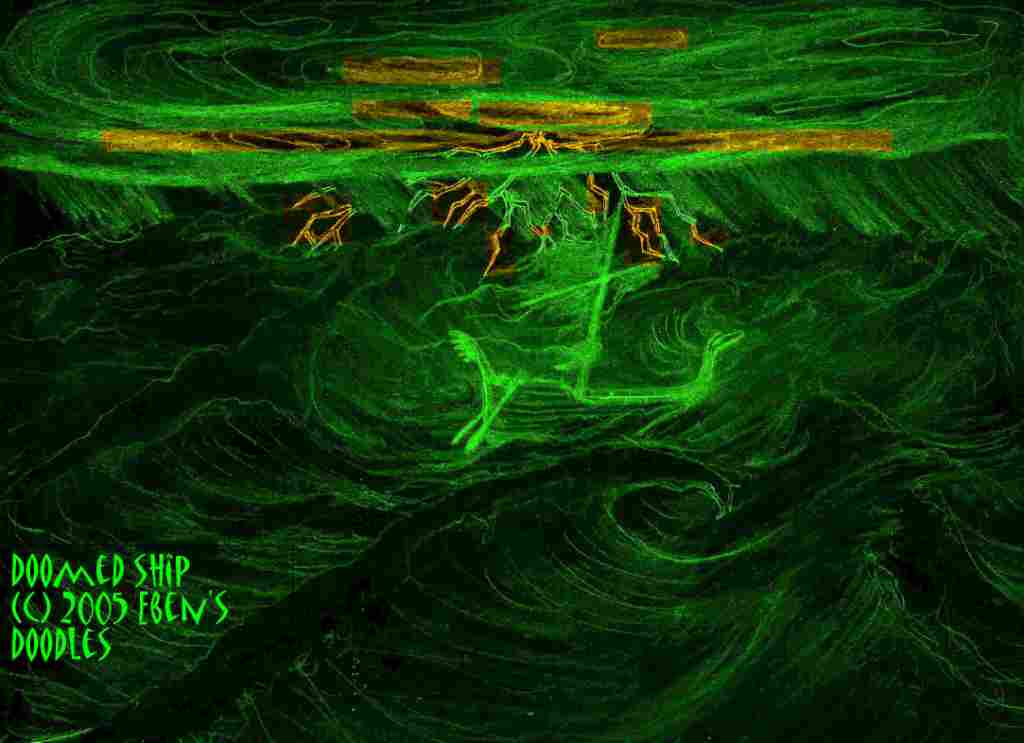
O F
T H E
P E A R L
D I V E R
A N N O
S T E L L A E

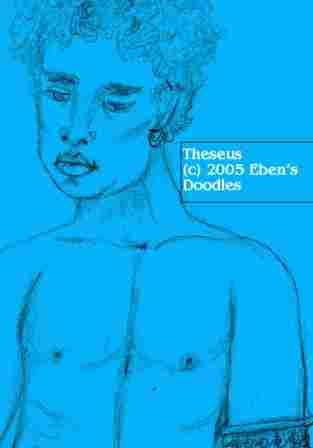
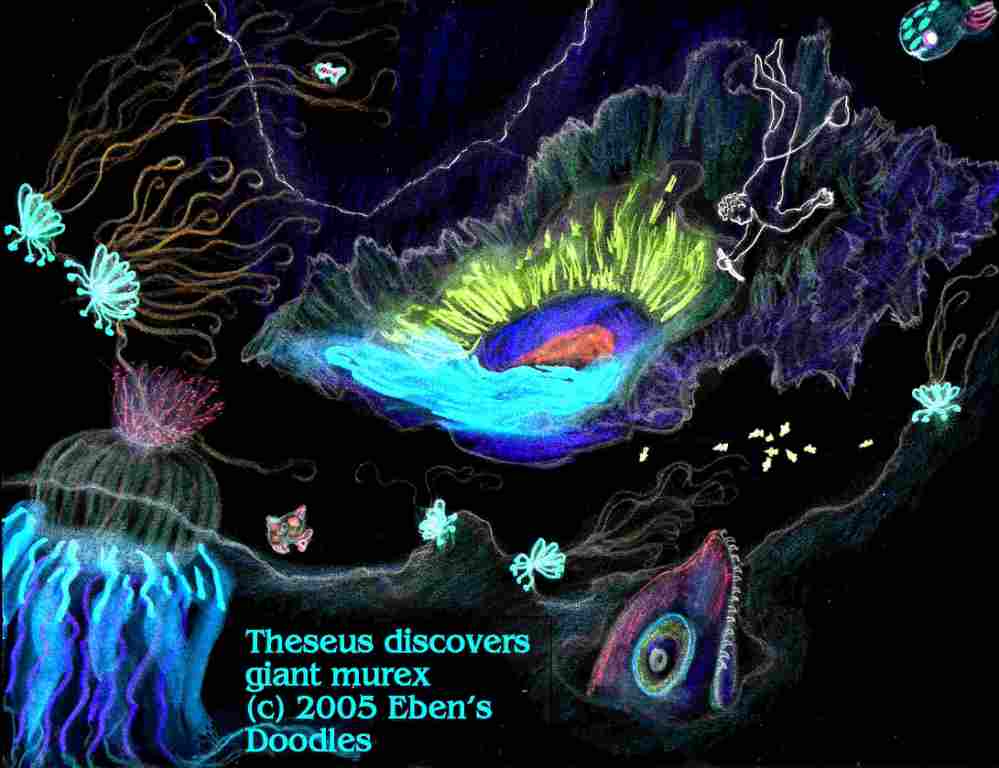
Using the wily arts of his intelligent, half-Mycenaean nature and his winning and helpful ways, he had gradually gained trust and along with it secret knowledge they passed on to only their most trusted apprentices--or sons, if they still had any (for kings over them were known for eliminating the families, to keep the state secrets from being spread from his realm to that of his rivals). Theseus somehow knew better than to pry into the wounded, hard-shelled hearts of such men, who would have been afraid of offending the king. And, truly, the king the Minos treated them well, affording them much honor and prestige as his royal masters. He also gave them nice quarters in the palace and all they could want of wine, women, and song. The only requirement, however, was that they could never leave the palace, and so they only left it at death. Any master that was so foolish as to run away was quickly caught, brought back and tortured, and thrown to the monster in the Labyrinth to devour--that was the fate of few of them, since no one but the most desperated wanted freedom so much as to risk it.
Gaining forbidden knowledge this way, he had done it so cleverly, indeed, that each master craftsman did not suspect that Theseus was held in the very same affection and trust by another in the same shops of the king.
Since no master craftsman would dare speak openly of sharing his knowledge with a boy he regarded as his son, this silence aided Theseus in his penetration and theft of the king's most highly guarded secrets.
If it had been found out, Theseus would have been tortured to tell what he knew, then executed for knowing what he knew.
But who could have suspected a common errand boy of such a thorough-going espionage? Naturally, the many spies of the Minos never thought twice of the boy who was allowed to come and go freely in the shops since he had proved so useful there. Besides him, there were many royal servants and servant girls and slaves of all occupations--so one boy was not going to draw attention and draw their suspicion, if no one complained--and no one did.
Now the grand Minos was gone, and the glittering court and palace, entertainers, cooks, guards, spies, and master craftsmen-- all swept away like autumn leaves in a bitter, cold wind! He, Theseus, was now the master of Knossos the Mighty Palace City and Kingdom! Of course, there was still the Dauphin prince, Daedalus, to reckon with--but he had nothing really--and didn't know how the secrets and had not even a pair of flying wings to call his own anymore. Theseus, on the other hand, had everything necessary to take his place--and he would do that very thing--when the time seemed right.
But now it was time for a man to work! From one little part inside the bodies of the snails that only he now knew about, he drew the liquid that produced the purple dye he sought. This dye was so valuable, it was worth more than its weight in fine gold of Mizraim.
Filling his diver's bag with the parts, he later boiled them in a pot with some fresh spring water to produce the rich purple that even boiled down juice of grapes could not rival.
This dye was the most expensive in the world, and only kings and royal courts could afford to wear clothes with hems dipped in it. An entire robe colored purple was the same as wearing gold head to foot--and even kings shuddered at the cost of that, so hems were usually enough for them!
For some time he worked to make himself a dealer in purple, which could set him up in any of the major cities where it was in greatest demand by kings and princes and queens and princesses.
They would pay anything he demanded, he knew, for the high quality he was producing.
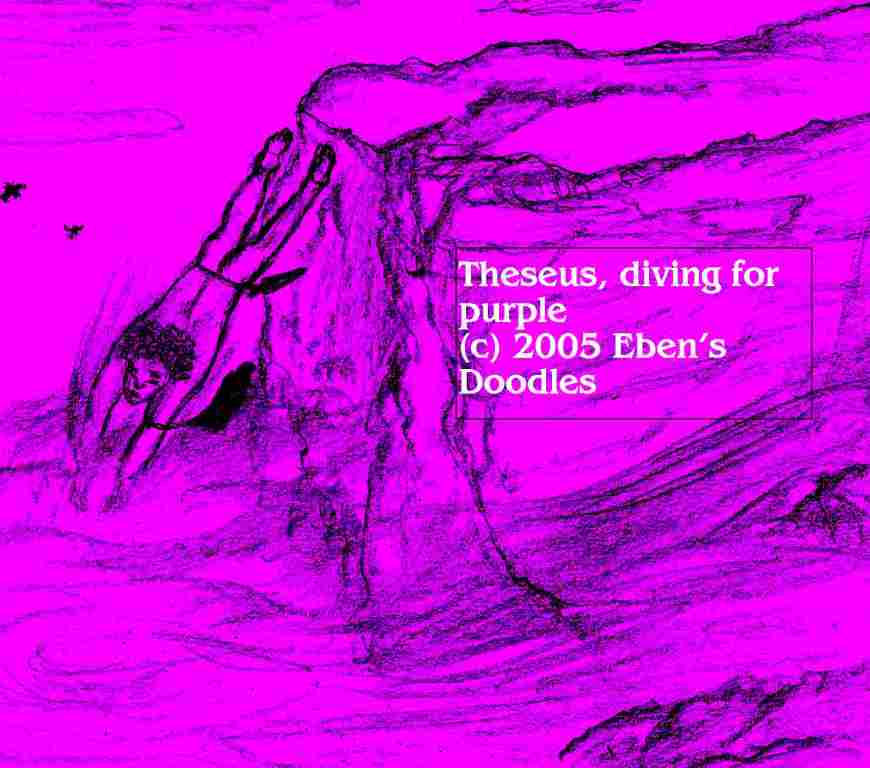
He next explored the tidal pools, after giving up on the areas where he knew divers had hunted snails in days gone by.
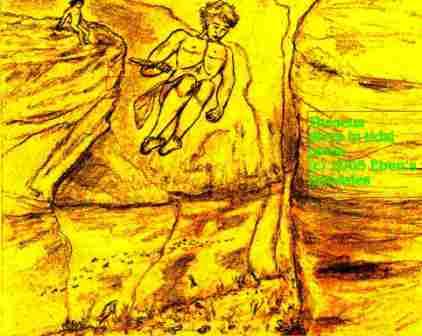
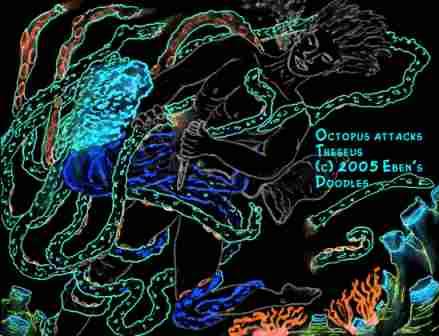
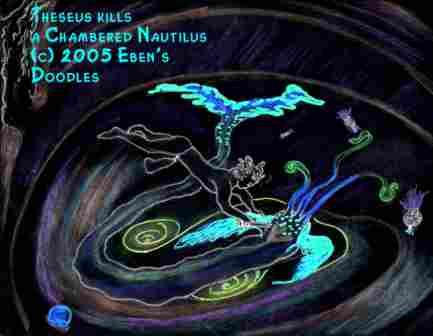
In exchange, the old man was commanded to stay closeted in the palace until his death, and he could not move away or even visit another part of the island. He was the same as a slave, since the day the king put him in the palace. After years of servitude, how he longed for freedom, despite the threat of being thrown to the roaring, horned monster, the Minotaur. Half-man and half-bull reputedly, the murderous beast-man continually roamed the underground mazes of the Labyrinth in search of shackled, condemned criminals to gore and trample and devour!
But now, aged to the point where he wasn't so afraid of death, he could not think of running away because his tottering legs would not get him very far--not far enough to make it worth the going, that he knew.
So, considering his prospects regarding life and death, he had unofficially and privately bequeathed his treasured secrets to the special, sweet boy he had come to regard as his own son--a son he would never otherwise have, since he was not allowed to marry once he entered the palace.
Concubines provided by the king were plentiful, but what were they but slaves--he could not love such women! Men who took them had nothing of sense, Dinos believed. So he had refused the king's women--preferring his solitary life to one that was dictated by the king in all respects.
What did it matter now if he gave his secrets to the boy Theseus? He knew the secrets would die with him otherwise, when he died. For he had decided to not give them up to anyone the king sent-—even on pain on torture he would not give them up to the king he hated.
All this he told to Theseus---in low whispers, lest any spy overhear them by way of a secret listening tube in the walls or furniture and report it to the king.
Theseus, bored almost to tears, had heard this same story again and again by this time from other masters in the royal workshops who doted on him. But he wanted the master of purple's trade secrets more any other workshop master's secrets, so he feigned all the sympathy and friendship he could possibly muster.
"Master, good master," he had cried in response, "you are a most dear father in my heart of hearts always!"
Sweet smiles, quick, willing hands, and a tear glistening in his eye when needed to show he cared about Dinos's suffering, all paid off. He learned all he needed to know to replace the master of purple at his craft.
Now the palace was destroyed, the king no longer in power had gone into hiding somewhere, and he, Theseus, was his own man-—a master of the royal purple! It was something to be proud of-—and he should be selling it and making huge profits and building a fine mansion for himself, For himself, his wife and concubines, and many children!
But how? He had the royal purple-—pots and pots full of it-—but absolutely no way to get it to the big markets in Tyre and Sidon, Avaris, Illios, and other places. He had to get a ship himself somehow, he resolved. But how? They cost much money and much labor To produce, and no one was going to lend him one. All he had was purple dye, and they would take it from him in force, and he would be back to where he started—- a poor orphan who had spent the money he had once earned at the palace running errands and doing favors.
His mother? She couldn't help him, even if she wanted. She was off to Ilios with all the others who managed the high fares of the Myceneaean shipmasters.
His father? Though his mother loved him, and said so many times, she could never tell him who his father was--she could not recall which sailor it was who had visited her the day he was made. Maybe she had several "guests" that day. She often did.
He soon realized it was no good to be angry at her, or his lost father--there was no help for him that way.
Now he had to reach the world by his own efforts and wits alone-—or his wonderful purple and all his hard work to find and produce it were wasted!
While he figured out how to get his treasure of purple sold, he helped his enemy, Daedalus, the Royal Prince, build his ship so he could wrest the vessel somehow from his control when it was finished.
Would he have to assassinate the prince? He had no desire to do that--but of course a man had to defend himself if ever he was set upon by another man, prince or not!
He knew Daedalus needed sailors to man it once it was completed, and who but Theseus could Daedalus find on the ruined island to help him, when even the farmers starved in the hills and, having eaten their oxen, were too weak to pull a stone-weighted adze for a plow.
Ariadne, slipping out from the ruins one day to join the other wild children, changed everything! She had given him his first love of a woman, and now he liked to please her, dreaming of the life he would make for them together by selling purple to the rich and mighty. Ariadne was not her birth name. No one knew it, and she would not give it, so Theseus named her with a Mycenaean name, and she smiled and accepted it.
Unfortunately, Daedalus hated their love, and so Theseus had to decide between working for Daedalus and keeping Ariadne.
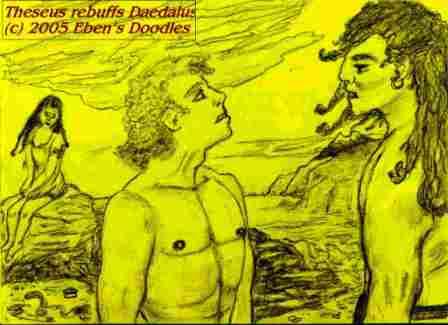
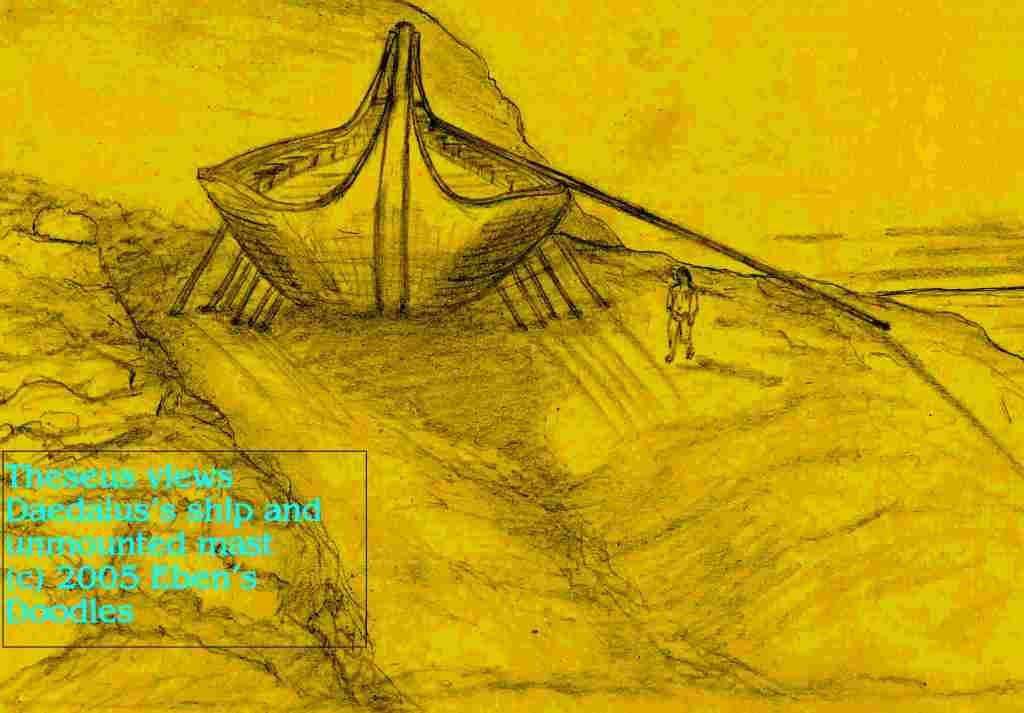
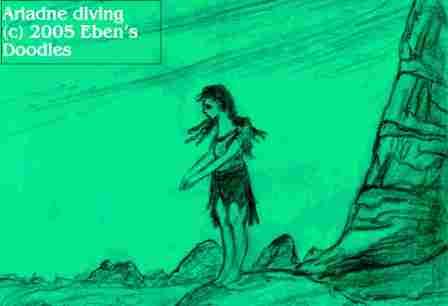
Theseus took his purple on board, letting Daedalus know about it, to blunt Daedalus's hatred and suspicion and possibly persuade the prince, now the captain, to allow him to keep on with Ariadne. He offered to let Daedalus profit in the sale, and sell the remainder. There was plenty for both of them. This seemed a fine plan, only Daedalus claimed the whole stock as "King of Keftiu." Once on board, there was nothing Theseus could do about it. If he objected, Daedalus as captain could order him to swim back to shore and be done with him.
Having no choice but to accept Daedalus's outrageous theft, Theseus was not unhappy when the whole voyage came to naught soon after the ship was launched.
They had no sooner caught the winds of the northern mountains in their sails strongly when they ran into an armed fleet, Mycenaean warships, returning home from action in Mizraim in the south.
Daedalus's ship was destroyed when they tried to escape from being captured and made slaves. To save themselves they had been forced to run aground.

Now what was he to do, his hope of getting off the island
with his purple dream utterly quenched and put out like a palace torch thrown into a pool? It didn't matter that the prince had saved the lives of many of the
smaller orphans struggling in the big waves--it was all his fault it had happened in the first place!All seemed lost--the ship, his prized purple, and the chance to make a new life with himself as Minos and Ariadne as his queen in gold in purple--lost!
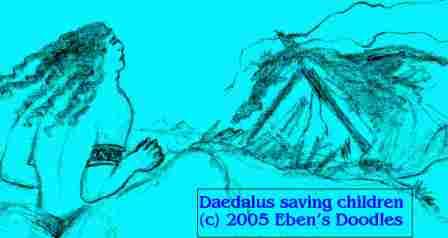
Now Theseus thought hard about it. The king's marker, he had heard, was set somewhere in the deep water. But what did he care about that? He would ignore it, even if he saw it! The king was gone, along with his thousand palace guards and hundreds of armed navy vessels--who would be able to catch and punish him for trespassing? Who? Nobody but Daedalus--and the poor prince was often gone for days and even weeks, seeing some pretty woman down at the docks who had foolishly stayed behind to serve the occasional Mycenaean navyman or merchantman.
So he was free to do as he pleased in the royal waters!
Then he thought of something. It was a wonderful thought, he knew in an instant. He had dived for purple, but there was something there almost as valuable in the waters that people the world over treasured and would pay a lot of money for— pearls!
Purple could wait! He had plenty left he hadn't taken on board Daedalus's ship, the ill-starred Pride of the Minos. He could still sell it for gold if a merchant ship came visiting the island. With some of the gold he could buy passage on another ship (not risking being killed for his gold by the shipmaster to whom he sold the purple). Then later he would return to Keftiu and take it over.
In the meantime, without even selling the purple, pearls would do as well. He could save his purple for later sale, after he reached a foreign port city. With pearls he could buy him an entire ship to get off the island. Seamen would part with their ships, though they be captains and owners, for such royal pearls as he believed the king’s pearl beds could produce.
So he started diving there to look for the pearl oysters, and was amazed at the pearls he found in abundance.
Some pearl oysters out in the deep wate grew hugely, and the pearls in them were also giants. No one knew why. It was the gods' favor, they believed.
He gathered hundreds of the big pearls.
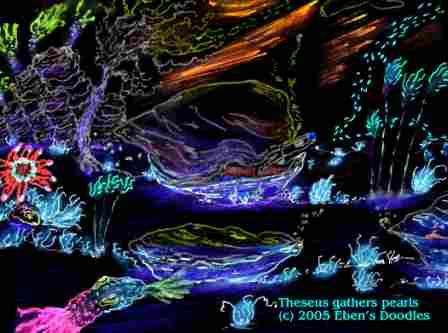
It was unlikely he would see any sails, as Knossos and the entire island were known to be desolate and nearly all abandoned to wild beasts, and so there was no trade for merchants to deal in, unless they wanted a few baskets fashioned by farmers' wives or the trinkets people were still gleaning from the ruins of the palace.
But he couldn't give up, evenso. One sail--who knows? Maybe it was marked with his destiny--the golden destiny he felt glowing deep in his heart!
Exploring farther out, he discovered the king’s royal landmark, which once inspired terror, as it meant that any trespassers would be killed and cut to pieces and fed to the man-eating fish in the king’s big pool at the palace, just to entertain himself and his banquet guests! Now he could do what he wanted with the hated king’s landmark, and nobody would know or care-—except Daedalus, of course, and he wouldn’t know.
Theseus returned the next day with a rope. He hauled a rock up to the top of the landmark and then lifted it and brought it down with all his strength. How he hated the king’s marker, and only meant to knock a hole in the roof if he could.
He was amazed when, instead of a hole, the entire structure crumbled and collapsed into billowing dust. He swam up to the surface, wondering what had happened. Then he thought how a particular rock he had learned about in the palace workshop, which was dug out of a mountain on a neighboring island, was so light it could float on water, and maybe this was the reason.
The rock used to build the landmark was easy to work into whatever shape the king wanted carved, then his sailers floated it out to to the royal pearl beds tethered between two ships, and then let it down to the sea bottom with heavy bronze weights on long ropes. Once anchored on the bottom with the bronze weights, the ropes were drawn up. But it could never be touched, because a slight blow would destroy the landmark—it was so delicate. And no one had dared touch it-—not until now!
The sea bottom, he found, erupted with hot water and also melted rock-—out where the pearls grew to the giant sizes he sought. The beds there had never been touched, he decided—-and the pearl oysters had never been harvested-—since the king’s divers mightily feared both the razor-toothed fishes and the smoking pots on the sea bottom (for the holes in the bottom that shot hot water, smoke, and fire, looked like smoking pots with fire in them).
He, Theseus, feared nothing of the sort! The pearls were his! his!
Thanks to his lungs, which he had discovered were capable of holding enough air for the deepest plunges, no pearl oyster could elude his grasp!
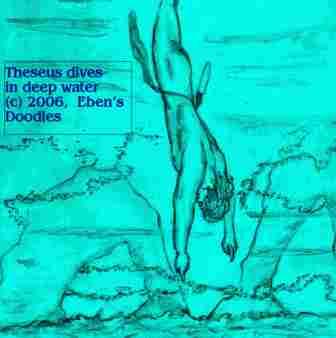

Despite how confident he felt in his great diving powers and experience, he was far from shore and took thought to be more careful, since he realized there was no telling what kinds of monsters lurked in the caves beneath him.
The pearls, however, were so big and marvelous in beauty he soon forgot the big fish with mouths full of razors that prowled the area. And the boiling pots? They wouldn't scorch him, if he kept from swimming directly over them. He was rewarded, when one pearl was sufficient to fill both hands.

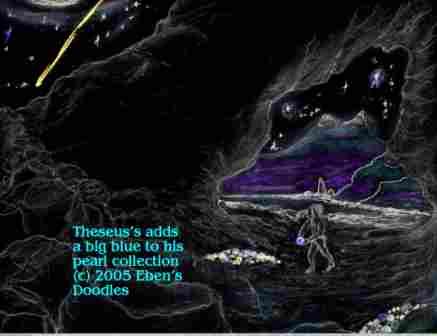
One day exploring a cave he found an immense pearl oyster-—which he feared would not produce a pearl, or would never be open when he went to look. Day after day he dived and visited the pearl, but it was always shut.
Then, at last, he found it wide open! It was sending out its seed on the waters, and so was defenceless during those moments! He could dive right to the glowing spot inside where he knew a pearl was hidden.
What he found nearly took all his remaining breath away.
He tried to pull out the pearl, but it was too heavy! He tried again and again! his movments must have disturbed the oyster, for he noticed the remaining light was disappearing. The shells were closing him in! He would be trapped and drown there inside the giant oyster!
He kicked and got out just in time as the giant shell closed. But he had moved so fast he shot right into a mass of green hell-—a stinging jellyfish of monstrous size. He kicked and pushed himself out of it, but not before it had stung him hundreds of times. His body felt on fire.
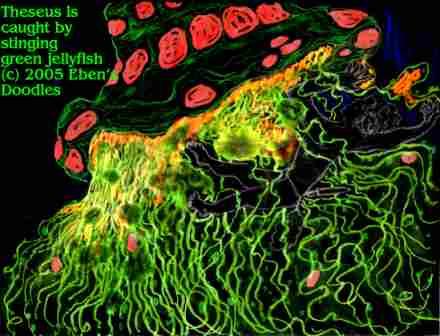
Gasping and screaming in pain, he shot to the surface, unmindful of the Sickness of divers who came to the surface too quickly-—and then-—darkness.
Where he was, he had no idea. He could not see anything. He felt only excruciating pain spread over his entire body, making him twist like a worm in the fire. He choked and gasped, and water poured from him. He was so sick—the sea water, the stinging pain, the poison of the jellyfish—he was out of his mind.
He couldn’t move where he lay in the surf, his head down in the water as he thrashed weakly about with his hands and legs.
Then he felt strong hands seize his arms and pull him upwards. He felt himself heaved up, then slung across a man’s shoulders.

He was not a human being but a fever, a raging heat, but gradually the fever and swelling died down, and strength and a human shape returned to his body. He could move his limbs again. He looked up to see who had nursed him back to life, and it was Daedalus! Ariadne also helped, as he knew she would. But he knew it was his enemy who found him and restored him back to life! That thought troubled him, but he put it from his mind, considering that Daedalus had never done him any good.
As he lay recovering, he thought of ways he could get back to the Pearl of great price that he had discovered.
He considered whether to tell Daedalus his secret-—then decided against it. As the former king’s son, the prince would naturally claim the pearl as his own property as the king’s heir just as he had claim all the purple. And he, Theseus, the true origin of such wealth, would get nothing! He knew Daedalus, though saving his life solely for Ariadne’s sake, would not let him gain any advantage whatsoever-—especially one so great as to be the possessor and owner of the World’s Pearl.
Nevertheless, he had to get a ship to pull the pearl up from the sea bottom. It was too big for any one man to handle. But how was he to do that, if he couldn’t trust Daedalus the puff-headed princeling not to claim it?
With many hours to think as he lay on his bed Daedalus had given him in the house for his recovery, he had plenty time to make a good plan. He had all the other pearls hidden away-—he could let the Prince of Nothing have all of those he wanted. That would put him off the true treasure. Then he could get the prince to buy a boat to take the pearls to market. The prince would be eager to do that, as he was just as anxious to leave ruined Keftiu, where there was no living hope, to start a new life somewhere in the world where men still throve and had built fine cities and splendid palaces. That was the life Prince Daedalus desired, and Theseus knew it. He could use that desire to get his own way and become master of the World’s Pearl—-for it was big enough and of such unsurpassed purity and brilliance and lustre to make him the world’s richest man-—so he could get anything he wanted-—Ariadne, a palace, concubines, everything a man desired! If there was anything more than that--well, he could get that too!
As soon as he could move on his own, with Ariadne gently holding his arm and guiding him over the rough spots in the path, he went to gaze out at the sea where his secret treasure, the Pearl of Great Price, lay safely and closeted deep in the waters by the smoking pots. How he yearned to return to it! The Pearl had stolen his very soul! He would lie, cheat, steal, even murder for it, to gain possession.
Daedalus, when he presented him with a few small pearls, was instantly taken with their beauty and size and wanted more. What's better, he never thought of, nor mentioned if he did, the king's landmark and ban.
“O Prince, I will give you many more I gathered especially for you,” Theseus said sweetly, his eyes on the prince who couldn’t take his eyes off the jewels in his hands.
“Your Majesty,” Theseus added with his honied voice, “if only you had another boat, you and all of us who serve you here could take them to the big markets in Tyre and Sidon and elsewhere and gain much gold for your royal treasury! You could rebuild your father's royal palaces here, and bring in many people and good farmers and craftsmen. You could even rebuilt your great warfleet and master all the islands and cities stolen from you by your enemies. You could regain all your father ruled with his golden scepter! Well?”
Daedalus sat down right then and there—-for he saw this golden dream, though a mere boy of foreign blood reminded him of it, was truly his heart's desire. With such fine pearls in his possession, all that Theseus had suggested was now within reach. The pearls were his, by right! He would claim all the pearls, then command Theseus, soon as he was strong again, to help him get a ship, and then they would sail off to Tyre and…
His golden future was assured!
His own heart leaping for joy, Theseus knew, looking at Daedalus’s excitement, that he had won his enemy's heart and soul over to his secret plan.
Let the long-haired fool dream away! ee thought. Once he had the Pearl of Great Price up from the sea bottom with the first ship they could buy from the traders (he would seek the Pearl at night when Daedalus was sleeping, or see to it somehow that Daedalus was not able to hinder the work!) he would sail away with it, taking only Ariadne and the biggest boys to help him sail the ship! They would leave Daedalus behind-—that would serve him right for all the indignities he had heaped on everyone! Worst of all his cruelties and insults, Daedalus had forbidden his love of Ariadne, just because he was half-Keftuian! He could never forgive Daedalus for despising him for being the son of a port harlot and a drunken Mycenaean sailor out for a good time on the town. Despite the fact he could not name his father, he was a man, fully a man, as much a man as Daedalus-—and then some! He had proven that many times over by discovering not only the purple-producing snails and then the pearls, all on his own without the prince's help, but by finding the World’s Pearl, the pearl with no peer, it was so immense and beautiful and priceless.
p> Theseus hummed little drinking songs of mariners as he lay on Daedalus’s bed, gathering strength. He walked as much as he could each day, eating whatever Daedalus managed to find and bring to his eating bowl.
“Soon, O Prince,” he said to Daedalus once, “you will have fine things to eat again, the very best wines too, as you once enjoyed in the great palace!”
“Yes, to be sure!” Daedalus agreed, going out to think about his change in fortune. He had taken the pearls Theseus had gathered and hid them in a place only he knew. He looked at them often, dreaming of the palace-city with many servants and concubines and thousands of nobles and their ladies that soon would be gathered round him on the throne, serving him as a god should be served.
He would rebuild the Great Palace of the Minos on the ruins of Knossos. He would also build a mighty warfleet, that would seize back the trade roots and trade cities from the upstart Mycenaeans of the Mainland, and then he, like his father the great Minos before him, command the high seas and all that passed upon their wine-dark waters.
Armed with such might and power, he would reach out and crush anyone who dared oppose him! His might and splendor would overshadow the earth--surpassing even his father's. He was destined for such greatness! He felt it in his heart of hearts! Theseus, the dog, knew nothing about such greatness. He would put Theseus in charge of the royal kennels--that was the sort of work that suited the low-born!
Theseus, knowing what was going through the prince’s mind, smiled to himself many times.
One day the children came running. They told Theseus first news of the ship whose sails were on the horizon. Better news soon followed. There was not one sail, but three!
There was no time to waste. He sent the children to start a fire on the high cliff above the pearl beds! Draw them here, he thought. He would then get Daedalus to barter a pearl or two, then offer more to buy the entire ship. Greed would gain an entire ship. The men would try to take them by force, if they saw Daedalus and Theseus were the only men guarding them—but if they offered only a few at a time—-while keeping their distance in the cliffs above the shore—the traders would be forced to deal honestly and fairly-—to a point anyway.
Only if they left a ship behind when they said would they be allowed the pearls they coveted! They had to be baited first with a few at first to win their trust and ignite their greed—-once the pearls had cast their spell, Theseus could get anything he wanted from them, as long as they didn’t see how few they, the men, were on the island.
The merchant ships approached warily, as they drove by the coast. The smoke, along with a flashing from a crystal handled palace mirror that a child had found in Daedalus’s belongings, continued to signal to them there was a trade on the beach for them to examine. When it seemed the merchant ships would actually come in to them, Theseus asked Daedalus to have the children spread some of them on a blanket on the beach-—they would do all the rest.
After the sailors had gone-—promising to return with yet another ship in exchange for more pearls—-Daedalus and Theseus and all the children celebrated as best they could with their scanty stocks of wild berries and pine nuts and a prize honey gourd stolen from a farmer’s garden.
It was everything Theseus had planned and dreamed—-and it had all come true. Now all they had to do was stock the ship with food and water, enough to get them to Tyre, three or four days sail if the winds did not blow them back on their course. They could take the usual merchant route, but that was lengthly and they might run into the merchants they had just bartered with, and who knows what they might do, knowing that they had more such pearls on board. They might well be boarded and all thrown overboard or tied up for the nearest slave market-—for they could not fight off so many armed sailors as were on the two remaining ships.
No, Theseus and Daedalus were of one mind in this, agreeing that it was best to sail straight across the sea to Tyre, only steering wide of any sail if one should appear.
Theseus, sleeping outdoors once again now that Daedalus had reclaimed his house and bed for his own use, continued with the rest of his plan as he had devised it. Several boys were big enough now to help him, and he counted on them to help him sail the ship and stand by, letting him down with weighted ropes to the oyster that held the World’s Pearl.
He set out in the dark of a moonlit night, the very first chance he got when Daedalus predictably ran off to the port to tell his lover his good fortune and enjoy some of her womanly comfort.
Theseus knew how to sail the ship (having watched the port ships and helped on board some of them for a piece of fish and some bread). It was not so big as many were, which helped him and his small crew.
The wind was too slight, so they oared the boat part of the way.
Theseus had no idea where the great Pearl lay, so he had to dive first to fix its location in his mind.
Would the oyster be open or shut tight? He had no idea. All he could do was pray to the gods-— the same ones of the Mainland the sailors always named when they swore over bad luck at gaming or when a hull was discovered lost to ship worms or some such thing.
In a short time, he rose to the surface, triumphant. Now it was just a matter of weighting the ropes with rocks and he knew how to tie sailor’s knots, so it was his job.
Down he went, this time holding the lines, as he sank without any effort.
He had just a short time to do his work, but he was quick and able, having been born with sea water and fishes in his mother’s womb.
When he yanked, the boys on the ship began hauling him and the Pearl up.
They couldn’t haul both of them up together, so he left the rope and let it go up as he swam alongside.
When the Pearl broke the surface, the boys became silent and almost let it sink back.
Theseus shouted at them. “Don’t let go! Hold on! I’ll help you in a moment, soon as I board!”
With his strong arms, he pushed aside the boys and did the hauling himself. It was his Pearl! His! No one else would touch it, and he’d kill anyone who tried to steal it!
When he finally got it on board, careful not to scratch it on the hull by using rags and sailcloth to cover it before he pulled it up to him, he could not believe his eyes.
The boys stood around, gazing as much at him as at the enormous Pearl. He ignored them entirely as his eyes filled with the Pearl’s beauty and costliness.
How could he bring himself to sell it! He knew then that he could not let the Pearl go to anyone, no matter how much gold they offered. The Pearl had stolen his soul, he knew, and he didn’t mind that at all. He loved the Pearl with all his being! He was devoured by it, but the sight gave him so much rapture that he willingly surrendered himself in a kind of worship.
He lay down, his arms around the Pearl. He lost all sense of where he was, and what his plan was, and the possibility that Daedalus was on his way home and might find him and the ship gone.
It was impossible to tear himself away from the Pearl, now that he possessed it.
A boy came too close and reached out to touch it, and Theseus growled and struck the boy’s hand away.
The boys now shrank from Theseus, muttering to each other. A few moments later Theseus heard some splashing sounds, and turned, only to see that he was left alone on the ship.
He couldn’t care about that, and the time flew as he cradled the World’s Pearl in his arms. He wasn’t even thinking about Ariadne. What was she to compare with this Pearl? He now despised the little thing that crawled one day from the ruins. What did she think she was? he wondered. How could she think the owner of such a Pearl would want the likes of her? She Was no better than a port tramp, whereas he was a great Prince, richer than even Daedalus had ever been. No king on earth could claim such a Pearl as this. He, Theseus, was king of the Earth as long as he kept the Pearl. He could not possibly sell it. It gave him power and might and wealth beyond counting. It was rar more valuable than mere gold. It was far more rapturous than A woman’s arms in love with him. He wanted nothing more than this Pearl. It was everything to him-—life itself.
Dazed with his love for the Pearl, he stumbled back up the path to the house of Daedalus, intending to give him an excuse why he hadn’t returned the ship, which now lay at anchor out in the open sea. If Daedalus didn’t like that, let him swim out to it and bring it in to the shallows himself! He, Theseus, had better things to think about than a mere boat.
Theseus ears heard the wailing, but thought nothing of it as he went to the door of the house.
Two boys ran out of the house, and two others joined them, and they sped off across the fields toward some thick oak trees.
Wondering what had gotten into them, Theseus stood there gazing in the direction they had vanished. He was startled when Daedalus came out the door, almost knocking him over with a blow of his hand.
“You wretched cur of a harlot and a Mycenaean dog!” Daedalus shouted in his face.
Enraged, Theseus snorted back at him. “Don’t call me that, I’ll—I’ll—“
Daedalus had a knife too, and he stood as if he would reach for it.
“You’ll what?” the prince taunted Theseus. “Say what you will try to do to me! Dare say it, you cowardly whelp of a bitch in heat and a stinking Mycenaean he-goat!”
Theseus spun around, his knife in his hand, and his eyes shooting fire, but his heart so bitter it made him choke so that he was speechless in his fury.
Daedalus laughed. “So you don’t like the truth about yourself, do you! It’s all true! You're nothing but a worthless piece of trash! You killed her! Go see for yourself! They’ll look until they find her. She’s either thrown herself off a cliff or drowned herself-—thanks to you! Imagine, a mother of your child at her age! You were out of your mind, taking her as a man takes a woman, at your ages! Now you’ll pay the price! Only it won't bring her back! She's in Hades now, put there by your--your dirty, thieving hand!”
Armed, Daedalus edged toward Theseus, but Theseus no longer had a mind a fight. The bitter words had sunk into him like a poison-dripping sword. He was so choked that he could not resist Daedalus anymore.
Theseus let his knife drop. He turned, then ran after the boys. Daedalus watched him go, then slowly followed.
They found her just as Daedalus had said, only it was not how he thought when he first got the news from one of the orphans out foraging for food.
Theseus would not look at his child, which had never breathed. He saw the shape that could only be Ariadne, lying small and quiet on her side near a brand-new freshet that ran down the steep cliffs like a broken thread, born of a stray cloudburst between flanks of the mountain slopes above.
Daedalus swore by the name of Heaphes, then his face flushed with anger, and he spun on his heels and left Theseus alone with the body.
“The sneaking, little, evil-eyed fool, I tried to warn him off her!” Daedalus cried as he made his way back to his cheerless house. He needed a farm tool to dig her grave-—and that meant going to where he hid his tools to keep them from being stolen by the orphans or Theseus.
Later, when he returned with an adze, he found Ariadne’s body gone.
Astonished, he looked for Theseus. Shouting, he heard only the brook answered him back—-and he gave up.
“What has he done now with her?” he cried to the air and the brook that, as fast as it had appeared, now shrank back to a thread of its former size.
“Has the little monster gone crazy?”
With Ariadne’s death, everything changed, just as everything had changed when she first appeared. Following her golden thread, Theseus had seemed to change, becoming more and more like a man, just as now, turning the other way with her loss, he was shrinking and shrinking back to what he first was.
The thread of life was broken--at least for Theseus. He no longer wanted to hunt pearls. He had enough of pearls and purple and treasure hunting and secret dreaming. He gave all he had to Daedalus, because it all meant nothing to him. He had fallen in love with the Matchless Pearl and finally come to himself, only too late to save Ariadne from the monsters that now pressed up upon his mind from the depths below. Somehow he had let go of her as he reached for the World's Pearl...
“He’ll get over it in time,” Daedalus observed, watching Theseus in his grieving. “There’s always another woman to replace the one that’s lost.”
The first moment Daedalus set eyes on the Great Pearl onboard the ship, he was completely overwhelmed. Daedalus began making plans to vacate the bygone island kingdom of his father's. He had nothing to keep him there anymore except his lost, golden dream. The great cities of the world beyond the Green Sea beckoned him.
With the Great Pearl of pearls and the pots of royal purple Theseus had stolen and then, sensibly, turned over to him the rightful owner, Daedalus knew he could buy ships and clothing and slaves and concubines. He would rebuild the royal palace-city Knossos for himself and colonize the land with farmers he would bring in from Ilios-—people of his own race. Better than farmers, he would bring in master craftsmen, who made the fine, cunningly decorated vases the Mizraimites coveted and paid gold to obtain. Keftiu would again master the trade of fine vases for holding oil and foodstuffs and perfumes and jewels and treasure. Keftiu's cities would hum again with people and business and trade. Knossos and Port Amnisos, and all of Keftiu's seventy cities eventually, would rise, Phoenix-like, from the dead, cold ashes and ruins left by the Great Shaking and the Smoking Mountain! He, Daedalus, Would be a king and live as A king must live—royally—with A full court, a splendid palace, a thousand noble to attend his Banquests, concubines, wives and sons and heirs... a noble tomb to preserve his old bones when the time finally came to hand to let go of his golden scepter...
It had been his wildest Dream—-but now it was coming true!
As for Theseus, Daedalus could not care less what became of him. He was a nothing to him. Daedalus now had all he needed for a full restoration of his glory and kingship as the New Minos of Keftiu.
The morning Daedalus had set for sailing, he stepped out of the house and made his way down the path before the others had risen, just to make sure of last details and provisions on board the ship. His crew could join him later, but he had things to check that only a captain could see to.
He halted as he reached the shore. He could not believe his eyes. The ship was gone! No! He could barely make out the tiny sail, as it vanished on the horizon. Somebody--some fiend from Hades--had stolen his ship and the Great Pearl and all his golden future and dreams--
A horrible laugh met his ears, coming from the cliff above him.
A familiar voice, mocking him, was the fiend's. "I cut her anchor rope, O Great Prince! If you can swim fast, maybe you can catch your fine ship and rescue your great treasure on it!"
With a savage, barbaric roar like a Minotaur's, Daedalus lost all thought of royal dignity and sought only to rush and catch and slay the fiend if he could. But there was nothing except the mocking words in his mind as he raced back up the path, swinging and slashing at the air with his knife.
Finally, he collapsed, gasping for breath and spitting his rage out. Quieting slowly, he lay there, realizing what a fool and a beast he had made himself in the eyes of the mocker who had ruined him.
Rising slowly, the first eyes he met were those of Theseus, each of a different color. Only Theseus was no longer laughing at him.
"We are the same now, aren't we, you and I? I have nothing, and am nothing, and now you have nothing."
Daedalus stared at Theseus. He still felt such rage all he wanted to do was slay Theseus on the spot and cut him into a hundred pieces for the seabirds to devour. And he could have, for Theseus just stood there, a few feet away, leaning against a big rock, without much chance of getting clean away this time.
Daedalus raised his knife. He stared at it, as if seeing the horned, Minotaur carved hilt as if for the first time. His lip curled, and suddenly he flung it as far away as he could. As Theseus gazed at him with disbelief, Daedalus shook his thick dark locks like a horse might shake his mane and then spoke, his eyes meeting the mismatched pair still fixed on him.
"Yes," the Prince of Nothing agreed, "you are right. We are the same now. So let's go home."
Theseus turned, and, sensing something had changed in Daedalus, kept glancing at the prince's back as he followed him at his heel.
